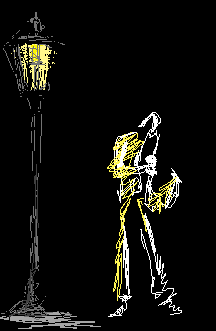Blogger's note. God knows how many years ago, I was standing around in a book store leafing through a book of poems by Billy Collins. I found this amazing poem about saxophones, almost forgot it, then tried years later to find it on the net. No sign of it. As so often happens, I had to go back years later to find it, and by then I had done the unthinkable: written my own poem, which likely has unconscious echoes of the Collins poem. Unconscious, not because I was unconscious when I wrote it, but because I only read the Collins poem once in haste before the store clerk glared me out of the place. Do I need to tell you that the Collins' poem makes me want to stop writing forever?
The Invention of the Saxophone by Billy Collins
It was Adolph Sax,
remember,
not Saxo
Grammaticus, who gets the ovation.
And by the time he
had brought all the components
together-- the
serpentine shape, the single reed,
the fit of the
fingers,
the upward tilt of
the golden bell--
it was already
1842, and one gets the feeling
it was also very
late at night.
There is something
nocturnal about the sound,
something literally
horny,
as some may have
noticed on that historic date
when the first odd
notes wobbled out of his studio
into the small,
darkened town,
summoning the
insomniacs (who were up
waiting for the
invention of jazz) to their windows,
but leaving the
sleepers undisturbed,
even deepening and
warming the waters of their dreams.
For this is not the
valved instrument of waking,
more the smoky
voice of longing and loss,
the porpoise cry of
the subconscious.
No one would ever
think of blowing reveille
on a tenor without
irony.
The men would only
lie in their metal bunks,
fingers twined
behind their heads,
And when the time
has come to rouse the dead,
you will not see
Gabriel clipping an alto
around his numinous
neck.
An angel playing
the world's last song
on a glistening
saxophone might be enough
to lift them back
into the light of earth,
but really no
farther.
Once resurrected,
they would only lie down
in the long
cemetary grass
or lean alone
against a lugubrious yew
and let the music
do the ascending--
curling snakes
charmed from their baskets--
while they wait for
the shrill trumpet solo,
that will blow them all
to kingdom comeAFTER SEARCHING FRUITLESSLY FOR A POEM BY BILLY COLLINS CALLED THE INVENTION OF THE SAXOPHONE, THE AUTHOR TAKES IT UPON HERSELF TO WRITE ONE OF HER OWN
i
don’t know who invented this
reflexive
question mark of an instrument
but
i think it was a good thing
for
it’s great to look at,
with
fat keys like frog eyes
and
a big bell like royal jelly
you
could keep flowers in there if you wanted to,
extra
socks
or
even a clock
Snakes
kink too
and
this sound is snakey
purply
mauve as the deepest bruise
and
raunchy
as
a man in love
smoked
as some cat of the night
disappearing
over a fence
it
makes leaps
There
is no
morning
saxophone
this
is a sound that
pulls
the shades down
a
hangover
howl
fading
to twilight
or
the blackmost
navel
Few
can wrap their lips around
this
gooseneck
without
some harm coming to them
for
this is an instrument
with
a long history of
hollowing
out
all
but the most hardy
Bird flew into a pane
of
glass and was
we
don’t know why it does this to people
(maybe
it was mad at him
for
taking it all to such extremes)
but
how could you blow this thing
halfway
i
ask you
how
could you rear back
in
some great pained whiplash of the spine
without
a sense of
i
never much cared for
saxophones
myself
until
i heard one blown correctly at last
jazz
is a genre i will never understand
but
perhaps that’s good
for
like the priesthood, one must enter into it
without
question
reservation













